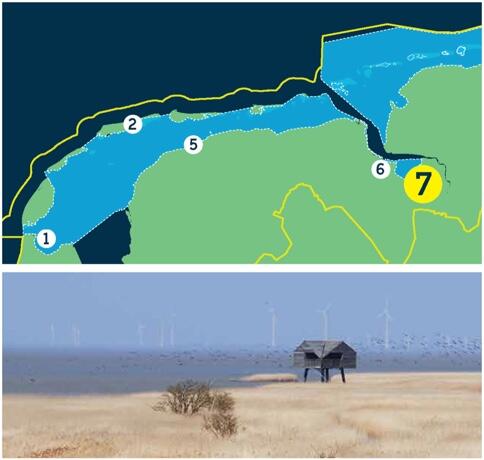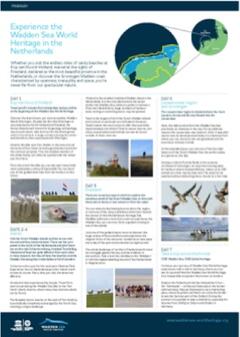Whether you visit the endless miles of sandy beaches at Kop van Noord-Holland; marvel at the sights of Friesland, declared the most beautiful province in the Netherlands; or discover the Groningen Wadden coast characterised by openness, tranquillity and space, you are never far from our spectacular nature.
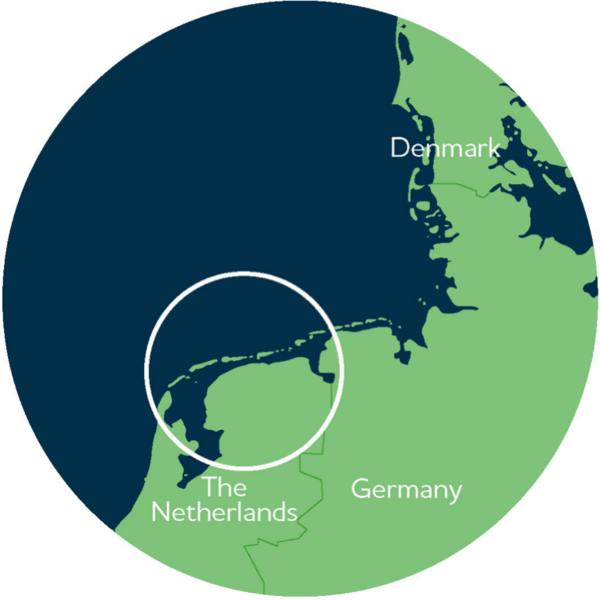
Day
1
Kop van Noord-Holland
Travel just 45 minutes from Amsterdam to reach the Wadden Sea World Heritage.
Discover the least known, yet most accessible, 'Wadden Island': Wieringen. Despite the fact that Wieringen is now attached to North Holland and Friesland, the former island is well-known for its geology, archaeology, nature and culture. Also look out for the Brent goose that is found here in large numbers during the winter.
The dike near Den Helder or around the locks of Den Oever is a good lookout point to scan for harbour porpoises. This smallest member of the whale family can often be spotted with the naked eye from here.
From the end of the dike you can also watch many birds, most noticeably a colony of Spoonbills. Just head to the harbour at Den Oever and book one of the guided boat trips.
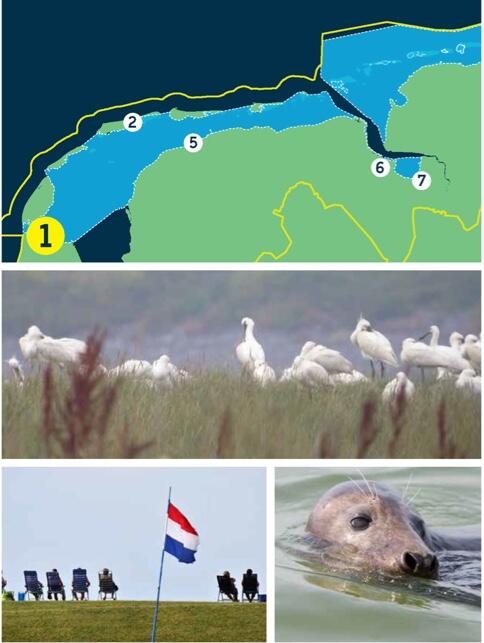
Day
2-4
Islands
Visit the Dutch Wadden islands to be at one with ebb and flow, sand and water. There are five such jewels in the north of the Netherlands and all of them are worth a visit. Schiermonnikoog, Ameland, Terschelling, Vlieland and Texel are quite different from each other in many respects, but they all have fine beaches, and the Wadden Sea off their coast is full of wonders.
Schiermonnikoog is, for the most part, a National Park. Experience here how an island develops when nature is left to take its course. Every time you visit the dunes will have changed.
Ameland is best experienced by bicycle, Travel from west to east along the Wadden Sea dike to nature reserve ‘Het Oerd” where many roes and rare plants can be found.
The Bosplaat nature reserve on west part of Terschelling is periodically totally washed over by the North Sea, creating a unique landscape. The area is also the first Dark Sky Park of the Netherlands.
Vlieland is the smallest inhabited Wadden Island in the Netherlands. It is the only island where the dunes border the Wadden Sea without a polder in between. From the Vlieland ferry, large numbers of harbour seals, resting or swimming about, may be spotted.
Texel is the largest of all of the Dutch Wadden Islands and is known in particular as a bird island. However, Texel's nature has much more to offer than just birds. Approximately one third of the surface of Texel is a nature reserve, but many unusual plants and animals can also be found outside of these reserves.
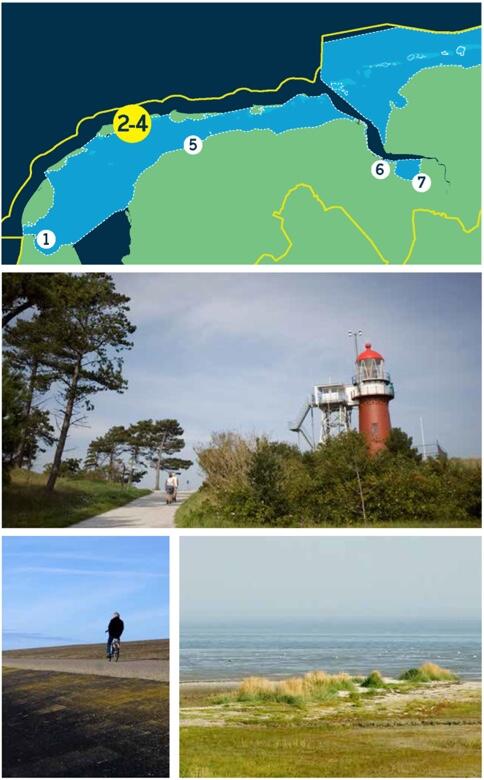
Day
5
Friesland
There are numerous ways to explore the wondrous world of the Dutch Wadden Sea: on foot with binoculars in hand, on two wheels or from the water.
You can attend a fascinating lecture about the region, or visit one of the many exhibitions which look ‘behind the scenes’ of this natural World Heritage Site. Mudflats walks are a must if you want to experience the Wadden Sea, you can even book a guided crossing to one of the islands.
Join one of the guided nature tours to discover the huge variety of fauna and flora and experience the majestic force of the elements! They take place every day of the year and sometimes even night.
The whole landscape of northern Friesland was formed by a struggle against the sea. Evidence of this struggle is everywhere. Take a look the old dikes at the ‘Biltdijken’ or visit the highest dwelling mound of the Netherlands in Hegebeintum.
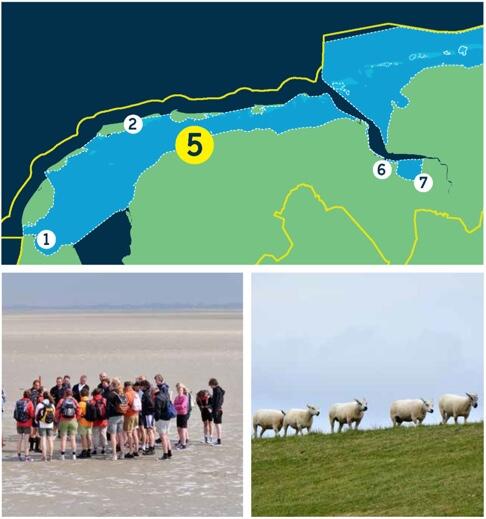
Day
6
Lauwersmeer region and Groningen
The Lauwersmeer region is situated where the rivers Lauwers, Hunze and Ee once flowed into the Lauwerszee.
The tidal current from the Wadden Sea met practically no obstacles. For reasons of sea defence the Lauwerszee was closed in 1968. A beautiful nature reserve developed and today it is a national park where you can marvel at the wet grasslands and the enormous richness in birds.
At Noordpolderzijl you can visit one of the few tidal habours of the Dutch Wadden Sea, the perfect place to experience the tide.
Visit Punt de Reide in the extreme northeast of Groningen. An important resting place for harbour seals is located offshore, where up to 300 animals at a time may be observed. Thanks to a low hide the seals can be watched without disturbing them.
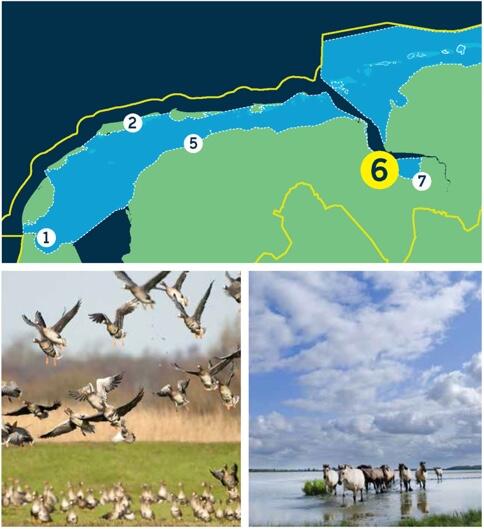
Day
7
Take a trip across the border
ONE Wadden Sea, ONE Global Heritage.
Continue your journey of Wadden Sea World Heritage experiences with a visit to Germany, where you can see for yourself that the Wadden Sea World Heritage is a continuous ecosystem that knows no borders.
Explore the Dollard Bay where the bird watcher's hut – the 'Kiekkaaste' – is at Nieuwe Statenzijl on the border with Germany. Nieuwe Statenzijl is a very interesting place, where cyclists and hikers can cross the border to see the German part of the Dollard. During the summer it is possible to take a small ferry, especially for bicycles from Delfzijl to Ditzum and Emden in Germany.
